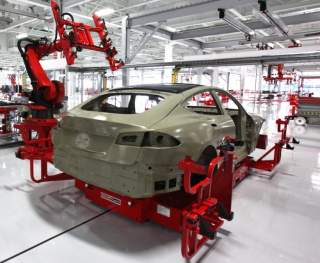When the Robots Rise
Will automation kill the middle class—and democracy with it?
Over the past decades, as the left’s historical constituency has shrunk, and stagnating living standards have bred ever-deeper anger against its traditional prescriptions, the left has started to lose support among poorer voters. It lacked a long-term vision that could grip the masses, while its policy prescriptions—even when sensible—were too technical to inspire devotion. That is why the automation revolution means not only a deep challenge but also a real opportunity for the left. The hope never to have to toil again has always been a deep part of the imagination of ordinary people. If the left can transform itself into a force that liberates ordinary people from the necessity of work, rather than promising policies that will marginally improve the nature and remuneration of that work, it can regain much of its lost vitality.
The right, too, has an alternative tradition it can draw upon to respond to the automation age. Originally, the most basic commitment of conservatives in the United States was to political, not economic, liberty. Conservatives have long feared that tyranny might begin to override the people’s right to govern itself, and that encroachments upon an individual’s right to think, speak and worship as he pleases would quickly follow suit. During the Cold War, as democracies were locked into an existential struggle with Communist regimes, the state’s meddling in the economy came to seem like the most potent threat to this kind of liberty. The road to serfdom, many Republicans now believe, starts with government regulation and redistribution. In the years since Communism ceased being a live threat, this economic focus has only intensified, in part because it serves the interests of economic elites—and of prolific donors to the Republican Party.
And yet, like the left, the American right can make a real contribution to confronting the automation age by drawing upon an alternative interpretation of its own tradition. Its economic views started out as a means of ensuring political freedom, not as an end in itself. By recognizing that an absence of economic redistribution now poses a greater threat to the maintenance of both self-government and individual rights than an excess of government meddling, it can come to accept new forms of redistribution as a necessary price for the maintenance of political liberties.
America is facing an economic future that will look very different from the recent past. So far, it has failed to understand its political implications. But in one crucial respect, the coming robot age is not so different from the world today: whether it turns out to be a good or a bad place for most human beings ultimately depends not on the material conditions of life but on the political response to them.
Lee Drutman is a senior fellow in the political reform program at New America and author of The Business of America is Lobbying. Yascha Mounk is a lecturer on government at Harvard University as well as a Carnegie Fellow at New America. He is currently working on a book about the crisis of liberal democracy.
Image: Inside the Tesla Motors factory. Flickr/Steve Jurvetson.

